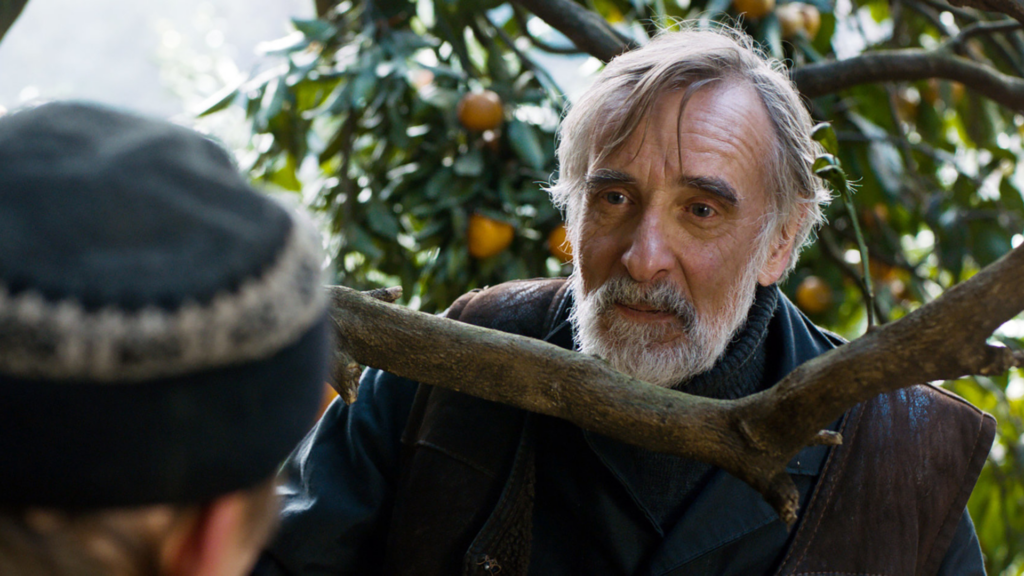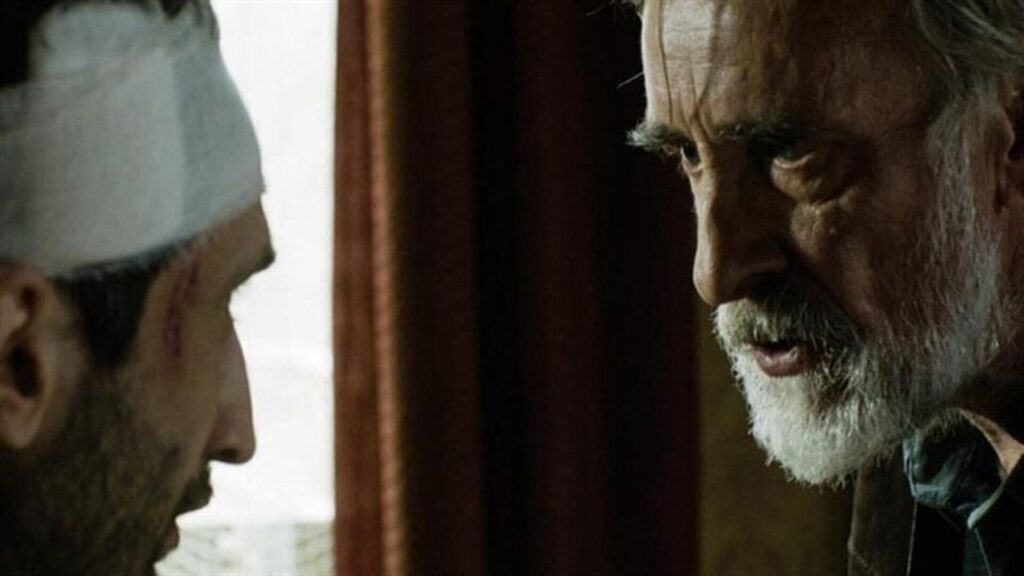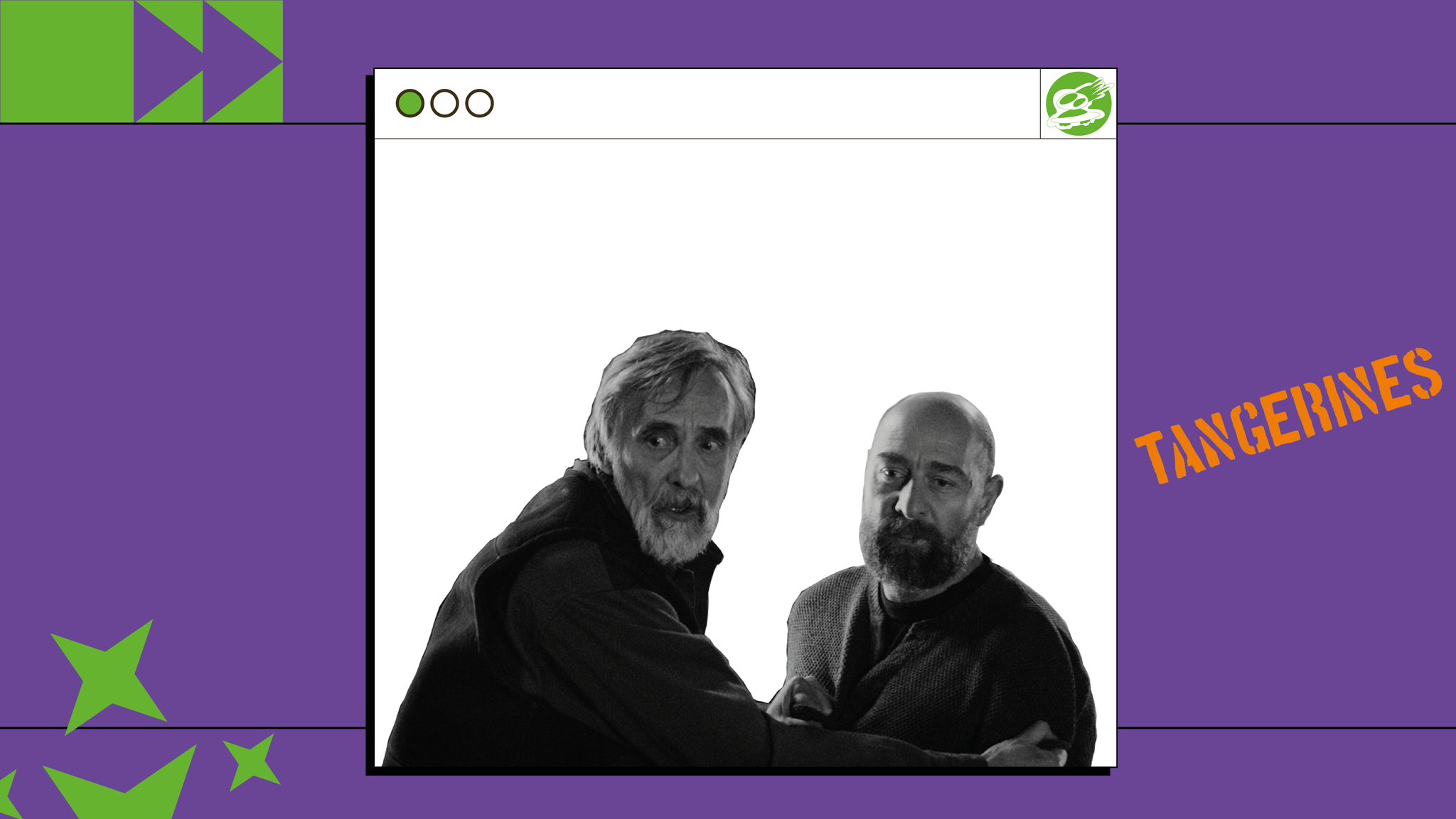Zaza Urushadze’s “Tangerines” is a 2013 Estonian-Georgian film set during the 90s war in Abkhazia. Possibly one of the most famous movies coming out of Georgia during the 21st century (due to widespread acclaim in conjunction with an Oscar nomination), depicts an Estonian elder, Ivo, still living in an Estonian village of the region refusing to flee the conflict and helping his lone neighbor, Margus, pick tangerines. Tensions arise when Ivo gets visited by two Chechen soldiers asking for food, followed by a small, but deadly clash, between the latter and a van-full Georgian squadron. Survivors, a Chechen Ahmed and a Georgian Nika are nursed back to health by the village natives with the help of an acquainted doctor and Ivo’s house becomes a microcosm battleground resembling the actual war.
Ivo, played majestically by the late stage actor Lembit Ulfsak, is an old woodworker filled with melancholy and, at first glance, ridiculous stubbornness as he refuses to leave his home for safety. While his whereabouts may seem to be on the safer side, through interacting with external forces (both familiar and unknown), even two lone houses full of tangerine trees become minor battlegrounds – it is clear something is bound to go down. The opening shot of Ivo silently creating boxes creates a sense of mundanity of his everyday, lonely life and over the course of the movie, as we learn more about his recent experiences, we start to understand his philosophy and the refusal to leave, even when things start looking grim.
Ahmed, portrayed by Giorgi Nakashidze, is the first injured soldier brought to Ivo’s house, so when Nika, a Georgian soldier played by Mikheil Meskhi, who was thought to be dead also arrives in the next room, fighting for his life from a serious head injury, we see Ahmed’s internalized hatred for the enemy combatant. The feeling is mutual however, as soon as Nika has the energy to speak and stand, the two start bickering at each other. The good chunk of the film is spent nursing the two back to health and then listening to them argue and be at each other’s throat, it may start to feel a bit repetitive, albeit natural and expected. So, when another Chechen group of soldiers arrive at Ivo’s house, the two have to work together to ensure Nika’s survival. This event, on top of enjoying a meal together (again, with bickering about which of their cultures makes a better Mtsvadi), culminates with a much more violent encounter with Chechen squadron, where their collaboration is mandatory for survival.

All of the aforementioned events alone couldn’t turn enemies into brothers if it weren’t for Ivo. Through the course of the movie, we learn how close to the heart the conflict is to him – watching young men die, who have their full lives ahead of them, with their own dreams – really takes a toll on him. Mix that with sending away his family members for their own safety and a personal tragedy and we get a sad, old man filled with rage directed towards the powers that be, that cause all the death and misery.
Joint efforts, be it small jokes or brothers-at-arms activities, on top of Ivo’s worldview regarding the war, helps change the perception of the survivor, who instead of returning to the battlefield after being back on his feet, decides to just go home and see their family again. The ending shot of the movie, with a beautiful needle-drop of “ქაღალდის გემი (მე გადმოვცურავ ზღვას)” by Irakli Charkviani, underlines the character arc that can’t help but make the viewer a bit emotional.
While being a tight 85-ish minute film, the choice of the point of view of the war can seem a bit dry at first. Viewers get a good chunk of exposition and typical “he’s my enemy, I’m going to kill him at the first chance I get”, which gets a bit tiring after some time, as not much else happens during the first half. The intentional focus on the small, previously quiet house, now filled with residual dread and anxiety from the war delivers a unique perspective on the historical conflict and when the boom goes the dynamite, we get to see the relevancy of the choice.
The strength of the movie really shows when the first Chechen group arrives at Ivo’s house and the tensions rise through the roof and the cycle of “Devastating events occurring to the characters – touching life story” repeating until the end leaves no room to breathe in the best sense possible. This is also amplified by the usage of Steadicam vs handheld, where most of the indoor shots are filmed, naturally, with Steadicam, but when it switches to handheld, the viewer immediately notices that something’s gone horribly wrong.

Due to the previously discussed first half of the movie, I didn’t find myself engaged much in the movie, so when the emotional beats started to hit, I was shocked to find myself still getting emotional over the last 20 minutes of the film. I don’t want to take anything away from Urushadze and everyone who worked on the movie, but part of the connection I still felt after some detachment, I attribute to the historical attachment to the actual real-life conflict. Current political situations make this film relevant and with the way things have looked and are looking, it may very well still be relevant for many more years to come.


Comments